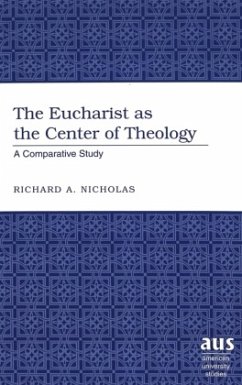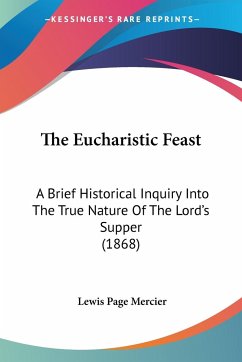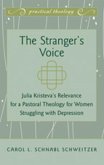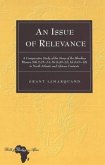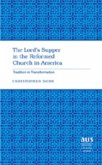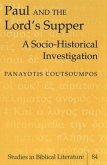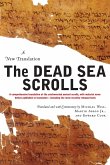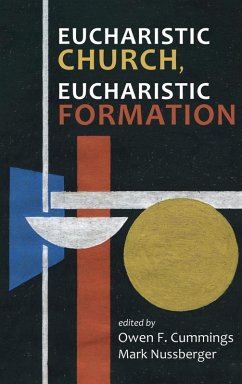One contemporary critique of Thomistic theology is that it dehistoricizes the relationship between God and creation. This position is a consequence of identifying the prius of theology as God. The Eucharist as the Center of Theology offers an alternative in that it examines a free historical prius, the Eucharist, as proposed by Donald J. Keefe, S.J., and then discusses and develops aspects of St. Thomas Aquinas' thought that support such a prius.
«Richard A. Nicholas' 'The Eucharist as the Center of Theology' is a probing and perceptive analysis that goes to the heart of theological methodology. While it begins as a comparative study of the theology of Donald J. Keefe, S.J. and Thomas Aquinas, it ends by developing potentialities of Thomas' thought that distinguishes Nicholas from the commonality of Thomistic scholars and places him rather in the Christocentric tradition of Thomisitic interpretation that stretches from Henrì Rondet and Andrè Hayden to Michel Corbin and John Jenkins. Keefe's work, less well-known than it deserves, is one of the more creative theological projects of the last fifty years. It is engaged in a broad metamethodological critique of how theology has been done and what needs to be done to rectify the neuralgic problems that emerge. Keefe insists that theology must understand its prime analogate where God, specifically Jesus Christ, is concretely to be found in the world. Nicholas' presentation of Keefe's thought is clear and precise and will admirably serve to introduce readers to this important work. He uses Keefe's insights, however, to fashion a set of questions, focused on a Eucharistic prime analogate, which he brings to the Thomistic corpus. For this reason alone his reading of Thomas is quite original. It is a reading, however, that is at every step tightly controlled by the Thomistic text itself. It presents a Thomistic vision of theology that is ever fresh and quite pertinent to the themes and tendencies of modern theological discourse. I heartily recommend this study.» (Rev. Earl C. Muller, S.J., Bishop Kevin M. Britt Chair in Christology, Sacred Heart Major Seminary, Detroit, Michigan)
«Several themes crucial for contemporary Christian theology are brought together in a carefully innovative way by Richard Nicholas in this most helpful investigation. How to build theology on the one rock, the «concrete universal», Jesus Christ, and that in a way which is historical and experimental, that is, sacramental. How to ground theology in an ecclesial, communion oriented sensibility. And, not least, how to place freedom at the very heart of the theological enterprise. Professor Nicholas mines the wealth of American theologian Donald J. Keefe, S.J., who proposes the Eucharist as the foundational ordering and governing principle of theology, its prius. Nicholas carefully presents Keefe's thesis as well as his critical view of the traditional prius as found in Thomas Aquinas, finding that Aquinas actually lends himself to Keefe's endeavor. This is a refreshingly deep and critical study, proposing a sacramentally rich Catholic theology at once metaphysically oriented and historically aware.» (Rev. Raymond Gawronski, S.J., Associate Professor of Theology, Marquette University, Milwaukee, Wisconsin)
«Several themes crucial for contemporary Christian theology are brought together in a carefully innovative way by Richard Nicholas in this most helpful investigation. How to build theology on the one rock, the «concrete universal», Jesus Christ, and that in a way which is historical and experimental, that is, sacramental. How to ground theology in an ecclesial, communion oriented sensibility. And, not least, how to place freedom at the very heart of the theological enterprise. Professor Nicholas mines the wealth of American theologian Donald J. Keefe, S.J., who proposes the Eucharist as the foundational ordering and governing principle of theology, its prius. Nicholas carefully presents Keefe's thesis as well as his critical view of the traditional prius as found in Thomas Aquinas, finding that Aquinas actually lends himself to Keefe's endeavor. This is a refreshingly deep and critical study, proposing a sacramentally rich Catholic theology at once metaphysically oriented and historically aware.» (Rev. Raymond Gawronski, S.J., Associate Professor of Theology, Marquette University, Milwaukee, Wisconsin)

